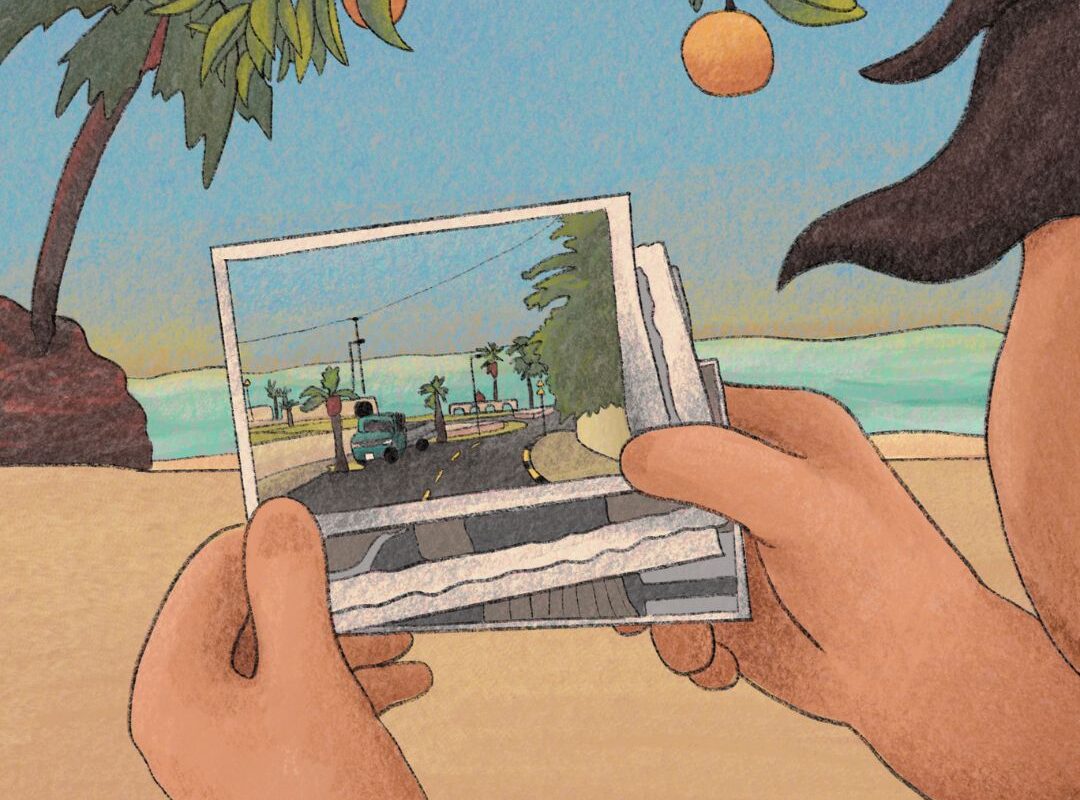Life on The Run, From One War to Another
Salwa found herself aboard a crowded rowboat at the port of Jaffa on an April day. The eight-year-old huddled near siblings and cousins en route to the Lebanese city of Saida. The boat, which just about survived the trip, belonged to her maternal grandfather, Mustafa Abu Shelleih, who also worked at the port. The city was under attack, to fall under Occupation mere days away. Abu Shelleih did not know that when he sailed his family north. In his mind, it was just until the mashakel (troubles) ended, and it would be safe for them to return.
Thousands of Palestinian residents of the city were driven to the sea at the port. Invading Zionist militias had blocked off land routes, shelling neighborhoods. Many boats sunk, Abu Shelleih’s did not.
After a long and arduous journey where the boat constantly threatened to capsize due to the sheer number of bodies that it was tasked with carrying, the boat arrived in Saida. Its passengers, who breathed a collective sigh of relief at surviving the journey, were greeted by relatives.
“They were very welcoming, and they behaved as if royalty had arrived from Jaffa,” Salwa says about her relatives in Saida. Expecting an imminent return to Jaffa, Salwa’s immediate family stayed in the Mieh Mieh refugee camp in South Lebanon before eventually moving to the Sabra neighborhood in southern Beirut.
This was the first time I recall my grandmother comfortably opening up about her expulsion from Palestine. She narrated the moments she regarded as key in her life.
In September 1964, Salwa married my grandfather, Adnan, who worked as a sports instructor at the YMCA of Lebanon. Adnan was also a refugee from Jaffa.
My mother, Houda, was born ten months later. The family lived in Haret Hreik. Salwa taught at an UNRWA school in Burj al-Barajneh camp, while Adnan started working for the American Life Insurance Company. They were always preoccupied with work, so my mother was raised by her namesake, Um Adnan — her grandmother. Houda was nine years old when Um Adnan passed.
Between the end of 1973 and the beginning of 1974, the family moved to Hazmieh. The move was prompted after my uncle, Khalil, disappeared for three days. Right-wing Lebanese militants attacked Palestinian groups near his school. Students were evacuated, and a teacher housed him in a town called Souk El Gharb. Salwa wanted to move closer to the school (and closer to all her children) should such a threat recur.
They lived in Hazmieh for one year when the unmistakable specter of mashakel forced them to move, once again, temporarily – or so they thought. The Syrian Army was invading Lebanon. The family never returned to that home, heading east.
“We found a furnished house [in Sawfar] that we planned to stay in for three months and then go back,” my grandmother says. “But we could not go back. Summer, winter…and then we moved to a place farther away.”
My grandmother lived a life on the run, escaping one war for another.
They first stayed in Qab Elias, then the village of Jdita, tucked into the Beqaa Valley. In Jdita, the family survived a bomb attack that led my grandmother to decide that the family must leave Lebanon.
“I remember the owner of the house saying to my mother, ‘You’re still alive?’” My mother tells me. When I asked my grandmother why she decided to leave, she simply said that it was “because of politics.”
In 1980, Salwa and her family left Lebanon. She first traveled alone, scouting a land famous for its temperate climate, juicy citrus fruits, and shining coastline. This was not a return to the family’s ancestral home in Jaffa — a return that the Israeli Occupation restricts to this day — but rather, she traveled halfway across the world to a place poetically known as Orange County.
While there on her own, Salwa arranged for a lawyer to facilitate her family’s arrival and bought a house in Cypress, a city that shared its name with a tree species closely related to the cedar on the Lebanese flag. Once all the preparations had been made, she returned to Lebanon to support the rest of her family in moving to California.
Houda, who was in her mid-teens by this point, was starting to become aware of her identity as a Palestinian. My mother recalls how her father argued passionately with their immigration lawyer when they sought naturalization. He refused to have his birthplace — and that of his wife — listed as “Jaffa, Israel” on their documents.
“[He said]: Israel was not there when I was born!” my mother adds.
Salwa worried that his outburst would prevent them from becoming U.S. citizens. They were granted half a victory, however. Although their documents do not state Palestine, they do not state “Israel” either.
Salwa, now 82-years-old, still resides in California. While my mother, Houda, lives in the Gulf, where I was born.
Houda moved to the Gulf in 1990 after marrying my father, whose family had been based there for decades, exiled from Jerusalem after the Nakba.
She found sanctuary at bookstores, spending most of her time reading and learning.
“Growing up in a war zone kind of distracts from things, I guess,” She tells me.
My mother and younger sister visited Palestine for the first time in 2019.
After I was born, my grandmother returned to Palestine for the first time since being forcibly expelled at sea as a child.
Salwa describes feeling connected to “the tenderness of the land, its water, its soil, its greenery, its homes, and families.”
She reconnected with cousins who had remained, surviving the violent colonization of their land. When I asked her if she needed help navigating the city, Salwa replied with an emphatic “No!” She remembered everything.

This article is a product of the ‘How to write your Nakba story?‘ workshop hosted by the Institute for Palestine Studies (IPS) and led by Laura Albast to commemorate 75 years of the Nakba. The series was supported by the United Palestinian Appeal and the Center for Contemporary Arab Studies at Georgetown University. The series was illustrated by Aya Ghanameh.
This story is also available in Arabic on IPS’s website and in Spanish on the website of El Intérprete Digital.
ABOUT THE AUTHOR:
Abdulla Moaswes is a writer, researcher, translator, and educator. His current academic explorations focus on the globalization of settler colonial logics. He has previously written about the politics of food, with special reference to chai karak, and the sociopolitical role of internet memes in South and West Asia. In addition to this, Abdulla also writes poetry and speculative fiction.

